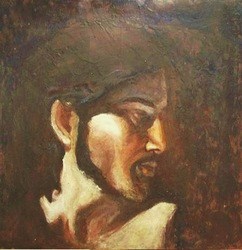
The first Beatitudes, each exhibiting an absence of one of the four elements, illustrate aspects of our personal relationship with God. By contrast, the second four focus on an overflow of these same elements. The excess of these elements are illustrated in four attributes which affect others, allowing us to share with those around us the benefits of a restored relationship with God.
If you're just joining us, the study begins here.
The Eighth Beatitude
"Blessed are those who are persecuted because of righteousness, for theirs is the kingdom of heaven."
"Blessed are you when people insult you, persecute you, and falsely say all manner of evil against you because of me. Rejoice and be glad, because great is your reward in heaven, for in the same way they persecuted the prophets who were before you."
For those who are curious, these verses contain many Greek terms of interest. I am limiting my study here to a few simple words that give the thrust of this Beatitude. Greek is a language that makes extensive use of a sense of movement, space and direction. There are two distinct spatial directions outlined in these verses: downwards into the earth, and upwards into the skies. These two directions by themselves suggest the medical condition described by an overabundance of earth, whose remedy was thought to be the sky element, ether.
oneidizo--cast in one's teeth
kath--down
dioko--righteous, innocent
chairo--rejoice exceedingly
agalliao--jump for joy, leap up
ouranois--to the skies
Roughly Jesus said, "Most highly favored are the innocent ones whose righteousness is cast down in their teeth. Rejoice, leap up into the sky! Generous will be your reward."
Among the great celebrities of Athens known for wisdom, Socrates (469-399 BC) stands out as a man of humility. He never called himself wise, stating the whole of his wisdom: "Only God is wise." He did, however, make every attempt to live righteously. He followed his conscience--the voice that he said warned him which actions to avoid--right to the grave.
Socrates couldn't have been a Christian: chronology prevented it.
Christian or not, few people appreciate righteousness for what it is. It always seems our best motives are the most easily misunderstood. Our most unselfish actions are in doubt because it would never have occured to our detractors to be so generous. Athens objected to the actions Socrates experienced as righteous.
Socrates was put to death on account of false accusations, as her citizens eventually realized. Like a prophet, he'd been trying to warn Athens and protect her from unrighteousness for years. Most historians agree Socrates was scapegoated for the fall of Athens--thrown under the bus.
Athens judged her people for crimes against their state by popular vote. Citizens cast either white or black stones to mark their "aye" or "nay." Each stone was counted to establish the majority's decision. The democratic system of Athens sentenced Socrates to death for the crime of "corrupting the young."
When the dust had settled during the generations following his execution in 399 BC, Socrates had become a new kind of hero to the Athenians: a hero of conscience.
But God does not give us gold stars for passing judgement, and the popular vote does not determine righteousness. It never has, and never will. Neither is righteousness a competition, nor a prize we can win by our own effort. Our reconciliation with God depends on the righteousness of Christ, not our own. When we truly enjoy the benefits of that reconciliation, we share it generously, we do not try to exclude others from it with lies.
For those who are curious, these verses contain many Greek terms of interest. I am limiting my study here to a few simple words that give the thrust of this Beatitude. Greek is a language that makes extensive use of a sense of space and direction. There are two distinct spatial directions outlined in these verses: downwards into the earth, and upwards into the skies. These two directions by themselves suggest the medical condition described by an overabundance of earth, whose remedy was thought to belong to the starry element, ether.
oneidizo--cast in one's teeth
kath--down
dioko--to pursue in a hostile manner
chairo--rejoice exceedingly
agalliao--jump for joy, leap up
ouranois--to the skies
Athens judged Socrates in this life, but it's not for you and me to judge what Socrates faces in the afterlife. There is only one judge. What Socrates gladly anticipated, as he stated in his defense recorded by Plato, was the greatest reward he could imagine--the opportunity to meet and converse with his heroes, the wisest men who had ever lived, and the "sons of gods." To gain this reward, he drank freely the hemlock the executioner handed him. Even so, we now know that the wisdom and the righteousness of Socrates could never have gotten him into heaven. If we meet him there, it will be because he shares with the rest of us a thirst to drink freely from the waters of life.

 RSS Feed
RSS Feed